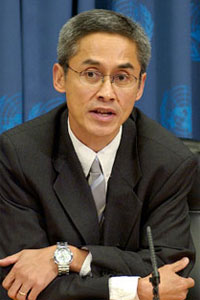
The momentum towards the passage of a law in Thailand to register same sex civil unions is most heartening and needs our fullest support. This is especially because it will legitimise mutual love and friendship without discrimination and without distinction.
In fact, there are three main issues to be addressed, bearing in mind that globally today, some 50 countries have laws to register same sex civil unions or marriages. Firstly, if there is to be a same sex civil union law, what are the lessons from other countries and what should be Thailand's path? Secondly, what of a law on same sex marriage? Thirdly, even where there is no law here on same sex civil union or marriage, is it possible to recognise civil unions or marriages registered abroad so as to facilitate access and residency by foreign couples in this country ?
Civil unions are basically partnership contracts between couples and they do not deal with the issue of whether religious personnel should be involved. There are at least three approaches to legitimise these partnerships. The first is the experience of France whose 1999 law adopted in a detailed manner key amendments to the French Civil Code and other laws, such as the Taxation Code and the Social Security Code, to confer benefits on same sex partners.
The second approach is shown by the United Kingdom which passed the Civil Partnership Act in 2004 stipulating the rights and duties of same sex partners (and not heterosexual partners), while adjusting some other laws such as the Children Act in the text, though not in a detailed form.
The third approach is offered by national laws that provide a framework of rights and duties of partners (whether same sex or not) without referring to other existing laws, thus providing an overarching law on the issue. This was the experience of Estonia in its 2014 Registered Partnership Act, covering "natural persons" of whom at least one has residency in the country.
The current draft of the Thai law on civil unions manifests possibly a fourth approach which implies reform of the Civil and Procedure Code on family and related matters , while offering new angles, such as detailed provisions on the adoption of children and on the dissolution of civil unions. The draft law does not, however, deal in detail with issues of taxation and social security, when compared with the experience of France.
Moreover, the Thai draft contains these stipulations. Civil unions will only cover same sex couples (not heterosexual couples). Persons over the age of 17 and above can enter into such unions but where such persons are 17 years of age, they need parental consent. There are then provisions on the rights and duties of partners, including mutual care, sharing of property and dissolution of relationships. By a general clause, provisions of the Civil Code are adjusted by the new law.
What of the possibility of same sex marriage law in Thailand? Marriage goes one step further than civil union: the couple are regarded as spouses -- as husband and wife. Historically, many countries have taken a step by step approach, starting off with a civil union law and later adopting a same sex marriage law. If there is to be a same sex marriage law, it may also have to deal with the issue of religion and the duality between civil ceremony and religious ceremony.
For example, under the 2017 Australian marriage law, religious personnel are not obliged to solemnise same-sex marriages if they object to them, but civil marriage and ceremony are open to all without differentiation. Denmark provides a good compromise: even though religious personnel can refuse to solemnise, the church must find another member of the church to solemnise the marriage. If Thailand were to take the quantum leap of adopting a same sex marriage law, it will also have to deal with the sensibilities in regard to religious weddings.
Finally, what of recognition of foreign marriages and civil unions? Very recently a high court of Hong Kong provided an innovative solution. Even though Hong Kong does not legitimise same sex civil unions or same sex marriages, it is now open to recognising same sex civil unions and same sex marriages officiated abroad, as a result of this court case. Thus entry of same sex couples (and related residency) is facilitated accordingly.
On this front, there are three options to help clarify the issue in Thailand. Firstly, foreign couples could test the situation in the local courts under the Thai Conflict of Laws Act whereby foreign laws can be cited before Thai courts as facts; this enables the local courts to consider recognising those foreign laws to the benefit of claimants.
Secondly, the current draft law on civil unions in Thailand opens the door to recognition of foreign marriages and civil unions, and related immigration matters, through future ministerial regulations.
Thirdly, as regards diplomats wishing to enter the country with their partners or spouses, a broad interpretation of diplomatic privileges and immunities under the Vienna Convention on Diplomatic Relations (to which Thailand is a party) should provide room for the recognition of their partners and spouses in Thailand, at least for the purpose of residency. The latter should be recognised as family members of diplomatic agents, rather than being relegated to a lesser status.
Progression towards a civil union law in Thailand is thus the welcome start of a longer term process, already implied by the National Human Rights Action Plan and the Human Rights Agenda adopted by the government, to respect human diversity and international standards.
Substantively, it must accompany the march towards the fuller realisation of human rights, democracy, peace and sustainable development, expeditiously and without fail.
Vitit Muntarbhorn is a Professor Emeritus at Chulalongkorn University. He was formerly a UN Special Rapporteur, UN Independent Expert and member of UN Commissions of Inquiry on Human Rights.
